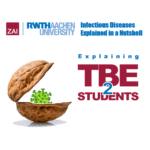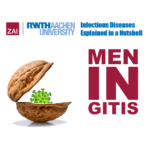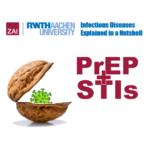Schlagwort: ‘Streptococcus’
Traveling to Africa as a Gap Year Adventure: Understanding the Risk of a Meningitis

Source: pixabay
Disclaimer!
This article and its major media content are produced by students to train science communication as part of a lecture about human infectious pathogens. The article does not represent official advice from the authorities. For authorized information about the disease in question, please refer to the official health authorities in your country or the World Health Organization.
By Franziska Broeske and Yuko Tanabe
Thinking about going on an exciting gap year adventure to Africa? Exploring new cultures, wildlife, and stunning landscapes can be an incredible experience. However, it’s important to be aware of potential health risks, including meningitis, and take necessary precautions for a safe and unforgettable journey.
The Meningitis belt
Meningitis is a bacterial infection that affects the protective membranes surrounding the brain and spinal cord. In Africa, especially in the sub-Saharan region known as the „Meningitis belt“, meningitis is more common compared to other parts of the world. Moreover, it is important to stay informed about the current infections during your trip. Keep in mind that the dry season is the most dangerous, with the risk of an infection being significantly higher. When you are interested in the latest outbreak and how the government handles the recurring outbreaks, you can read the comment, “Meningitis outbreak in Nigeria: Nigeria’s Inadequate Response to Devastating Meningitis Outbreak”, published in the newspaper TERRA*. The author criticizes the Nigerian government during the latest meningitis outbreak between October 2022 and April 2023. The bacteria involved in this outbreak are primarily Streptococcus pneumoniae and Neisseria meningitidis, which cause meningitis in young adults.
Cause and symptoms of the disease
These specific bacteria, which cause meningitis, are primarily transmitted through respiratory droplets, often spread by coughing, sneezing, or close contact with an infected person. Places like hostels, public transportation, or social gatherings can increase the risk of exposure. It is important for you to recognize the symptoms (fever, headache, vomiting …) and to be informed about the risks of a meningitis infection. Therefore, we suggest the video “Human Pathogens: Meningitis” for you to learn key facts about the infection and what actually happens in your body when you are infected with Streptococcus pneumoniae.
—
Prevention of a meningitis infection
One of the most effective ways to safeguard against meningitis is through vaccination. Conjugate vaccines are available and recommended for travelers visiting high-risk areas, including sub-Saharan Africa. Consult a healthcare professional or a travel clinic well in advance of your trip to receive the necessary vaccinations and understand the recommended schedule. To find out more about bacterial meningitis and its prevention, listen to the interview with Dr. Mark van der Linden, the head of the reference laboratory for streptococci at the Institute of Medical Microbiology at RWTH Aachen University Hospital.
—
Additional advice for a safe trip
In addition to vaccinations and vigilance, maintaining a healthy lifestyle during your trip is important. A balanced diet, regular exercise, and sufficient rest can strengthen your immune system, reducing the chances of infection. Don’t forget to purchase comprehensive travel insurance that covers medical expenses, including emergency medical evacuation. Accidents and unforeseen circumstances can occur, and having adequate insurance will provide peace of mind throughout your adventure.
Traveling to Africa during your gap year can be a transformative experience. By understanding the risks associated with meningitis and taking proactive measures, you can fully embrace the beauty of the continent, immerse yourself in diverse cultures, and create lifelong memories. Remember, your health and safety are of utmost importance, so plan wisely, stay informed, and enjoy an incredible journey exploring the wonders of Africa!
* fictional newspaper
About the authors:
 Franziska Broeske
Franziska Broeske
Master student in Biology “Medical life science”
RWTH Aachen University
 Yuko Tanabe
Yuko Tanabe
Master student in Biology “Medical life science”
RWTH Aachen University






